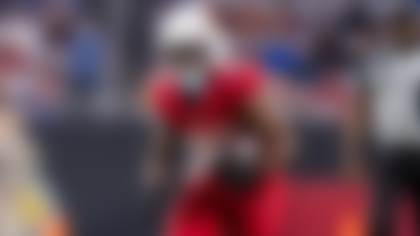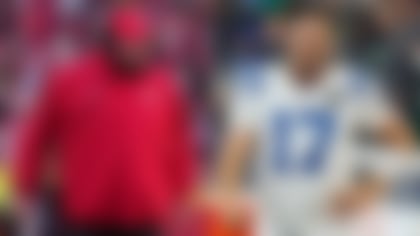The quarterback wave hit its most evocative nerve this week when a miserable Peyton Manning, confronting his own painful foot injury and perhaps his football mortality, admitted that by playing Sunday he had hurt his team. Manning has been benched -- let that sink in -- and it is unclear when, or if, he will be healthy enough to return, particularly if Brock Osweilerperforms ably in his absence starting this Sunday against the Chicago Bears.
Manning's sudden physical demise is only the most high-profile case in what has been a brutal year for quarterback durability, particularly for playoff-caliber teams. Tony Romo returns this week after missing two months with a broken clavicle to find a team that went 0-7 without him while enduring a sometimes comical struggle to replace him. What the Cowboys and ever-optimistic owner Jerry Jones learned, what the entire NFL is finding out now, is what everyone has suspected all along. Unless you have a backup quarterback who can win games, an injury to your starting quarterback will devastate your season.
Entering this week, it is expected that 11 teams will have had to use backup quarterbacks because of injuries to their starters this year. And if that isn't enough, the Steelers and Cowboys have had to use two different backups. The results have been predictably dispiriting. According to NFL Network research, the backups are 6-17 so far, with 19 touchdowns and 18 interceptions thrown. Only the Colts' Matt Hasselbeck maintains an unblemished record at 2-0. Six of the backups did not win even one game, including, most memorably, the Cowboys' Brandon Weeden and Matt Cassel. The Steelers' Michael Vick (2-1) is the only other backup with a winning record in games in which he has played this year.
If it seems as if the injury report has more quarterbacks on it than usual, it's not an illusion. According to NFL Network research, in the entire 2014 season, nine teams had to start backups because of injuries to their regular starting quarterback. In 2013, it was 10 teams.
"And you know they have put so much effort into protecting defenseless quarterbacks and police it well now," one AFC team's personnel executive said. "It's almost a heightened sensitivity to it."
Dallas is barely alive only because the rest of the NFC East is flailing, too, and Romo acknowledged this week that the Cowboys' dire situation plays a role in the timing of his return. The 35-year-old QB said he cannot know for sure if his clavicle is fully healed.
"You won't know," Romo said. "Honestly, every time you come back, there's going to be a few weeks where you're risking it -- that's part of when you come back from a collarbone in seven or eight weeks, whatever. Always, the re-breakability is going to be there. That's a real thing, it happens all the time, but you've got to go play. We don't have much wiggle room."
The Broncos have a little more and may survive Manning's deterioration only because the defense -- and Manning in one throwback game against the Packers -- helped them to a three-game lead in the AFC West. Still, it is almost impossible to imagine the Broncos, despite a championship-caliber defense, making a Super Bowl run under these conditions at the game's most important, and seemingly vulnerable, position.
In Indianapolis and Pittsburgh, strong playoff expectations have been imperiled by the health of the starting quarterbacks. Andrew Luck is out for what could be six weeks with a lacerated kidney, placing the fortunes of the Colts in the hands of the 40-year-old Hasselbeck. The most telling part of that: Of all the teams struggling with quarterback injuries, the Colts might have the best backup plan. Unless it is Ben Roethlisberger, who had to come off the bench with a foot injury Sunday when the starter Landry Jones hurt his ankle. The Eagles (Sam Bradford, concussion), Texans (Brian Hoyer, concussion) and Jets (Ryan Fitzpatrick, thumb) all have banged-up starters whose availability going forward will go a long way to determining their postseason viability.
The NFL has long struggled with how to manage the backup quarterback spot. Ironically, the Colts might be in the best position now precisely because things went so poorly when Manning suffered the neck injury that so drastically altered his career. Until he missed the entire 2011 season in Indianapolis, Manning had missed exactly one snap in his pro career due to injury -- a broken jaw -- affording then-Colts president Bill Polian the luxury of essentially ignoring the backup role for years. After Manning was hurt -- and the Colts collapsed to a 2-14 record with Curtis Painter, Dan Orlovsky and Kerry Collins -- Polian, who had by then been fired, told Bengals coach Marvin Lewis that he would still be in the Colts' front office and not working on television if he had only drafted Andy Dalton to be Manning's backup in the spring of 2011. That cautionary tale is one reason why current Colts general manager Ryan Grigson was so intent on finding an experienced and capable backup for Luck.
Grigson was fortunate to lure Hasselbeck to be Luck's backup. But last summer, Todd Haley, the Steelers' offensive coordinator who's had to ready Vick and Jones to replace Roethlisberger this season, forecast the problem he and the rest of the league have faced this season.
"Let's start with there's not enough good quarterbacks to begin with," Haley said.
Three more things to watch around the NFL in Week 11:
There are three critical games to watch this weekend -- and part of what makes them so compelling is that all six teams have healthy starting quarterbacks.
1) There's been a momentum shift in the NFC North. The Packershave lost three in a row, the receivers are struggling to get open and the defense hasn't gotten a sack in that span. While that's been going on, the Vikings have won five straight. With a one-game lead in the division, the Vikings have a chance to put the Packers in a hole and will use Adrian Peterson, who is averaging 107 yards per game, to try to do so. The Packers' bigger concern may be whether their offense can get anything going against a Minnesota defense that is third-best on third downs and has allowed 23 or fewer points in each game this season.
2) Injuries could play a role for New England against Buffalo. It's hard to imagine the Patriots losing at home to the Bills after dominating them for most of the game in Buffalo in Week 2, but the thing to watch is how the Pats adjust their offense, which is now missing Dion Lewis and Julian Edelman, who accounted for 47 percent of New England's scrimmage yards in that early-season game. Largely overlooked in the shadow of the Patriots' offense is that the scoring defense is ranked fourth -- and New England's second in run defense. That's a problem for the Bills, who would prefer to run first and have gained at least 100 yards in eight of their nine games. They'll try to put the game in the hands of Tyrod Taylor, who probably will have trouble getting out of the pocket against this defense.
3) Carson Palmer said this isn't just another game. Even if the Cardinals' quarterback wasn't talking about his bitter split from the Bengals, he'd still be right. The Bengals and Cardinals are two of the most well-rounded teams in the NFL -- both with top-five scoring offenses, the Bengals with the top scoring defense and the Cardinals with the third-ranked overall defense. The Bengals are coming off a lethargic performance against the Texans in their first loss of the season, though, which has rekindled the talk that they, and quarterback Andy Dalton, are not quite ready for prime time. Dalton, who is tops in the league passing against the blitz, could see plenty of it from the Cardinals, who have the third-highest blitz frequency on pass plays in the league. Cincy's defense has not allowed more than 24 points in any game this season, but the Cardinals, with Palmer throwing downfield, have scored at least 30 points six times this season and have allowed just 17 points per game at home.
Follow Judy Battista on Twitter @judybattista.












